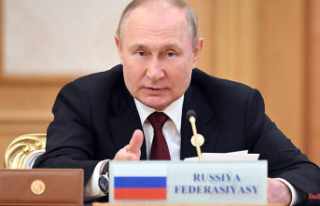NATO is strengthening its forces and that will be expensive: At the end of the summit in Madrid, the British prime minister put a price tag on the new defense capacity: 2.5 percent of GDP would probably have to be targeted in the future. US President Biden also talks about money.
British Prime Minister Boris Johnson has called for an increase in military spending by NATO countries, citing 2.5 percent of gross domestic product (GDP). The previous goal of 2 percent comes from a "different era," the conservative politician explained at a press conference after the NATO summit in Madrid. At the "historic summit," the defense alliance agreed on a new strategic concept that would require higher spending. There is broad agreement on this in the military alliance.
"We want NATO Secretary General Jens Stoltenberg to start working on the new goal now and he has committed to doing that," Johnson said. According to Johnson, Britain is investing heavily in long-term military capabilities. "The logical consequence of the investments we are targeting is that our defense spending will reach 2.5 percent of GDP by the end of the decade," continued the British Prime Minister.
US President Joe Biden has announced that his country will send $800 million more weapons to Ukraine. At the same time, Biden emphasized that a majority of NATO countries are now in the process of exceeding the alliance's two percent target for defense spending. Biden reiterated that NATO and its member states will support Ukraine as long as it is needed. He doesn't know exactly how the war will end or when it will end. But: "It will not end with Russia beating Ukraine in Ukraine."
Germany wants to permanently provide an armored division with 15,000 men, 60 aircraft and 20 naval units to protect NATO's eastern border. In addition, there is the establishment of a regional naval command in the Baltic Sea, said Federal Chancellor Olaf Scholz in Madrid after the end of the NATO summit. By increasing their forces, the NATO countries did not violate the NATO-Russia Founding Act. It is important not to revoke these, even if Russia violates them massively.
The forces would be deployed as soon as possible. After all, the Russian attack on Ukraine showed that you have to be prepared. At the same time, the chancellor promised to ratify Sweden's and Finland's accession to NATO very quickly. The federal government will start this this week. Russia's President Vladimir Putin has come to terms with the NATO accession of both Scandinavian countries. Scholz confirmed that Ukraine would also receive military support for as long as it had to defend itself against Russian attacks. It is not yet possible to say how long this will be. Putin's accusation that NATO has imperial intentions is "ridiculous." It is a defensive defense alliance that does not attack anyone. Putin himself, on the other hand, has imperial dreams.
In the dispute over Russian transit traffic to the Russian Baltic Sea exclave of Kaliningrad, Scholz called for relaxation. It is up to the European Union to set the necessary framework conditions, said Scholz. The rules should "of course always be determined in the light of the fact that this is about traffic between two parts of Russia," said the Chancellor. "And I believe that everyone involved is currently trying very hard to establish a de-escalation dynamic here."
In mid-June, Lithuania banned the rail transit of some goods through its territory to the area around Kaliningrad - formerly Koenigsberg - that are on Western sanctions lists. Russia criticized the restrictions as "illegal" and threatened countermeasures.
At the end of the summit, NATO Secretary General Jens Stoltenberg said the alliance was there to protect all member states. This also applies to Finland and Sweden. "We are prepared for anything."












